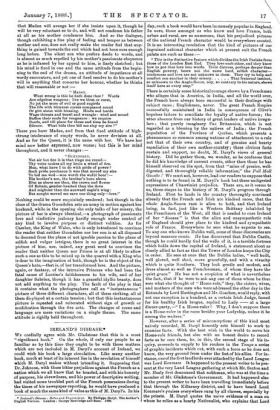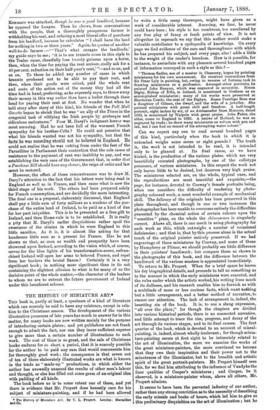IRELAND'S DISEA.SE.*
WE cordially agree with Mr. Gladstone that this is a most "significant book." On the whole, if only our people be as familiar as by this time they ought to be with those matters which are not included in M. Daryl's account of Ireland, we could wish his book a large circulation. Like many another book, much at least of its interest lies in the revelation of himself which M. Daryl makes without intending it. Supposing that Dr. Johnson, with those bitter prejudices against the French as a nation which we all know that be boasted, and with his honesty of purpose, his shrewdness, and his power of descriptive writing, had visited some troubled part of the French possessions during the times of his newspaper-reporting, he would have produced a book of much the same kind of value as this of M. Daryl's. In his • Ireland's Disease : Notes and Impressions. By Philippe Daryl. The Author's English Version. London : George Routledge and Sons. 1988.
day, such a book would have been immensely popular in England. In ours, those amongst us who know and love France, both urban and rural, are so numerous, that his prejudiced pictures of the national French character would be everywhere scouted.
It is an interesting revelation that the kind of pictures of our ingrained national character which at present suit the French palate are such as these :—
" This is the distinctive feature which divides the Irish Pariahs from those of the London East End. They love each other, and they know how to put that love into words. Their distress, perhaps deeper than English poverty, bears not the same hard, selfish character— tenderness and love are not unknown to them. They try to help and comfort one another in their misery That fraternal instinct, so unknown to the Anglo-Saxon, nay, so contrary to his nature, shows itself here at every step."
There is certainly some historical courage shown by a Frenchman who alleges that in America, in India, and all the world over, the French have always been successful in their dealings with subject races ; Englishmen, never. The great French Empire successfully maintained in India in consequence of Olive's hopeless failure to conciliate the loyalty of native forces ; the utter absence from our history of great leaders of native irregu- lars; that purely imaginary Pax Britannica, which is not
regarded as a blessing by the natives of India ; the French population of the Province of Quebec, which presents a phenomenon so common among nations of attachment to a rule not that of their own country, and of genuine and hearty repudiation of their own mother-country ; these obvious facts sustain and support, no doubt, M. Daryl's views of general history. Did he gather them, we wonder, as he confesses that he did his knowledge of current events, other than those he has himself observed on the spot, from that "mine of precise, well- digested, and thoroughly reliable information," the Pall Mall Gazelle ? We mast not, however, lead our readers to suppose that
nothing is to be found in M. Daryl's book but these undigested expressions of Chauvinist prejudice. There are, as it seems to us, three stages in the history of M. Daryl's progress through Ireland. First he lands in the country thoroughly convinced already that the French and Irish are kindred races, that the whole Anglo-Saxon race is alien to both, and that Ireland being, in fact, just like a Western Brittany inhabited by the Frenchmen of the West, all that is needed to cure Ireland of her " disease " is that the alien and unsympathetic rule of England should give place to the kindred and sympathetic
rule of France. Everywhere he sees what he expects to see. To any one who knows Dublin well, some of these discoveries are beyond measure comic. He has discovered that Dublin Castle, though he could hardly find the walls of it, is a terrible fortress which holds down the capital of Ireland, a statement about as
closely allied to fact as that the Tower of London keeps the City in order. He sees at once that the Dublin ladies, " well built, well gloved, well shod, move gracefully, and with a vivacity which is quite Southern. They look gentle and modest, and dress almost as well as Frenchwomen, of whom they have the quiet grace." He has not a suspicion of what is nevertheless the fact, that if he were to ask any one of those whom he thus sees what she thought of "Home-rule," they, the sisters, wives,. and mothers of the men who were addressed the other day in the Rotunda by Lord Hartington and Mr. Goschen, would reply, with not one exception in a hundred, as a certain Irish Judge, famed for his healthy Irish brogue, replied to Lady — at a large dinner-party,—" I a Home-ruler! Why, I don't suppose there is a Home-ruler in the room besides your Ladyship, unless it be among the waiters."
However, after a series of misconceptions of this kind most naively recorded, M. Daryl honestly sets himself to work to examine facts. With the best wish in the world to serve his Home-rule friends, but also with an honest desire to record facts as he sees them, he, in this, the second stage of his in- quiry, proceeds to supply to his readers in the Temps a series of graphic incidents which cut, with such a force as he does not know, the very ground from under the feet of his allies. For in- stance, one of the first landlords ever attacked by the Land League- was Lord Kenmare It happened to the present writer to be pre- sent at the very Land League gathering at which Mr. Sexton and Mr. Healy first denounced that nobleman, who was at the time a member of Mr. Gladstone's Government. It had happened also
to the present writer to have been travelling immediately before that through the Killarney district, and to have heard Lord,
Kenmare's praises everywhere sung by all classes, especially by the priests. M. Daryl qaotes the naive evidence of a man on whom he relies as a hearty Nationalist, who explains that Lord Kenmare was attacked, though he was a good landlord, because he opposed the League. Then he shows, from conversations
with the people, that a thoroughly prosperous farmer is withholding his rent, and refusing a most liberal offer of purchase from his landlord, because he calculates "I shall have the land for nothing in two or three years." Again, he quotes of another well-to-do farmer:—'' That's what enrages the landlords,' my guide says to me ; 'it is to see tenants come in this style to the Tralee races, cheerfully lose twenty guineas upon a horse, then, when the time for paying the rent arrives, coolly ask for a 40 per cent. reduction on their half-year's rent,' "—and so on, and
so on. To these he added any number of cases in which tenants professed not to be able to pay their rent, and then, when their goods were seized, paid the whole rent and costs of the action out of the money they had all the time had in hand, preferring, as he expressly says, to throw away their money in this way rather than have a bullet through their head for paying their rent at first. No wonder that when he told story after story of this kind, his friends of the Pall Mall Gazette began to shriek that he was "an ally of the Times in the congenial task of vilifying the Irish people by grotesque and ridiculous caricatures." Poor M. Daryl's indignant horror was most amusing. Had he not been full of the warmest French sympathy for his brother-Celts ? He could not perceive that what his friends wanted was not his sympathy, but that the facts he was recording should not be believed in England. He could not realise that he was cutting from under the feet of the Parnellites in Parliament their contention that the sole cause of resistance to the payment of rent was inability to pay, and was establishing the very case of the Government that, in order that a Purchase Bill should have any chance, the reign of order and law must be restored.
However, the effect of these remonstrances was to draw M. Daryl's attention to the fact that his letters were being read in England as well as in France, and then came what is now the third stage of his work. The others had been prepared solely for French consumption, and are decidedly the more interesting. The final one is a proposal, elaborately discussed, that England shall pay a little sum of forty millions as a nucleus of the pur- chase of the entire land of Ireland, to be paid as a kind of fine for her past iniquities. This is to be presented as a free gift to Ireland, and then Home-rule is to be established. It is really a pity that M. Daryl's earlier disquisitions rather spoil the sweetness of the strains in which he woos England to this little sacrifice. As it is, it is almost like asking for that handsome little sum as a present for France. Has he not shown us that, as soon as wealth and prosperity have been showered upon Ireland, according to the vision which, of course, serves for the blue lights of his transformation-scene, enfran- chised Ireland will open her arms to beloved France, and repel from her borders the brutal Saxon ? Certainly it is a very significant book ; in nothing more significant than in its not containing the slightest allusion to what is for many of us the decisive point of the whole matter,—the character of the leaders to whom we are to entrust the future government of Ireland under this beneficent scheme.























































 Previous page
Previous page